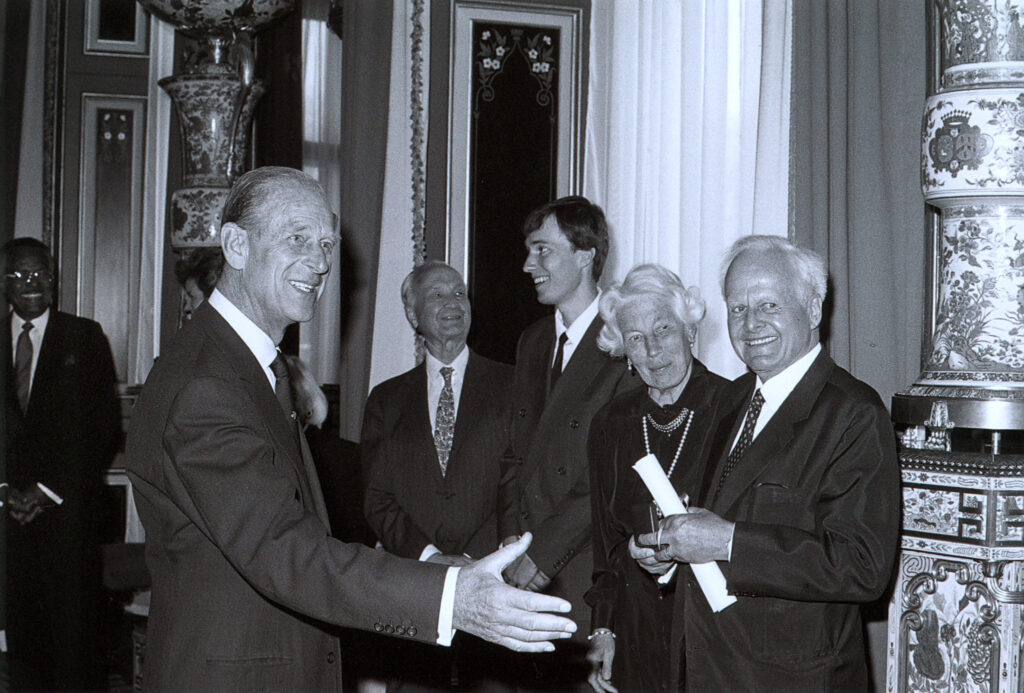Celebrating 1989 Templeton Prize Laureate Carl Friedrich von Weizsäcker
By Alyssa Settefrati
In 1973, the first Templeton Prize was given to Mother Teresa. In 2023, we celebrate the 50th anniversary of this award. Over the next 52 weeks, we will highlight each of our laureates and reflect on their impact on the world. From humanitarians and saints to philosophers, theoretical physicists, and one king, the Templeton Prize has honored extraordinary people. Together, they have pushed the boundaries of our understanding of the deepest questions of the universe and humankind’s place and purpose within it, making this (we humbly think) the world’s most interesting prize.
Carl Friedrich von Weizsäcker explored the intersection of physics, cosmology, and theology in work that placed him at the forefront of the effort to uncover harmonies between religion and natural science.
Weizsäcker was born into a notable family in Germany in 1912. His father was a German diplomat and state secretary in the Foreign Office during World War II, and his younger brother was president of the Federal Republic of Germany from 1984 to 1994. He studied physics, astronomy, and mathematics at University of Göttingen and Leipzig University, where he received his Ph.D. in physics in 1933 and joined the faculty as a physics professor.
During his time in academia, Weizsäcker worked with Werner Heisenberg, one of the main pioneers of the theory of quantum mechanics who published the uncertainty principle, and Niels Bohr, a Nobel Prize winner known for his work on atomic structure and quantum theory. Weizsäcker’s early research focused on planetary formation and the nuclear processes delivering energy inside of stars.
During World War II, Weizsäcker worked on the German nuclear weapons program and was a member of the team that developed the first nuclear reactor in Germany. Towards the end of the war, he was one of the German scientists captured by the Allies’ Alsos Mission and held at Farm Hall in England, where he remained until 1946.
He was then appointed Director of the Max Planck Institute’s theoretical physics department, where he served from 1946 to 1957. He also received the Max Planck Medal, the highest award of the German Physical Society, in 1957. In 1970, he founded and directed the Max Planck Institute for Social Sciences in Starnberg.
Weizsäcker turned his attention to philosophy after the war, publishing works on the relationship between science and religion, the role of ethics in science, and the nature of reality. He wrote and published more than thirty books on the moral, ethical, and environmental implications of quantum physics and atomic energy. His most famous work is The Relevance of Science, published in 1956, where he argued that science has a responsibility to consider the ethical implications of its discoveries and to work toward the betterment of humanity.

Weizsäcker was awarded the Templeton Prize in 1989 for his key discoveries in nuclear physics, along with his application of nuclear physics to astrophysics, which caused him to question the estrangement of religion and science and led to his investigation of Christianity’s obligation to technology.
Held at the Fumon Hall in Tokyo, Japan, the 1989 Templeton Prize ceremony was the first public ceremony outside the historic Guildhall in London, where it had taken place since 1973. Sir John Templeton, religious leader and 1979 Templeton Prize laureate Nikkyo Niwano, and former prime minister of Japan Takeo Fukuda gave speeches at the event.
When I was a boy I wanted to become an astronomer. I wanted to know the world in the broadest possible horizon. At the age of twelve I once went out into a wonderful warm and clear summer-night and looked at the stars. Two things were evident to me: God is present in this sky, and, as I have well understood from my books, these brilliant stars are hot gaseous spheres. What I did not understand was how these two evident perceptions were inter-related. To find the answer to this question, I felt, might be a task for a lifetime.
Carl Friedrich von Weizsäcker
Professor von Weizsäcker is convinced that Relativity and Quantum Physics offer thought structures by which religion may be renewed and be relevant to the modern world. When integrated with the Biblical understanding of God as the All-Encompassing Mystery who holds the world in a living contingent relationship to Himself, these enable us to appreciate both the benevolence and justice of God and the goodness of his creation. Such concepts facilitate our understanding of the universality of God’s love and mercy and inspire us to engage ourselves to bring about peace and prosperity to the whole of mankind.
Takeo Fukuda
Still Curious?
Learn more about Carl Friedrich von Weizsäcker.